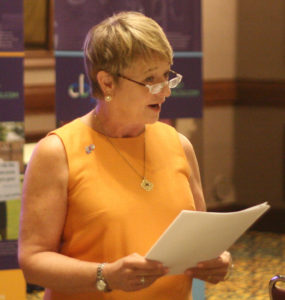The Cooperative Baptist Fellowship Governing Board adopted a process June 21 to guide the 1,800-church Fellowship through controversy amid renewed attention to the organization’s 16-year-old policy against hiring LGBTQ people since the June 15 mass shooting at a gay nightclub in Orlando, Fla.
“In a nation of such dizzying religious and cultural diversity as the United States, clashes can occur,” says a document outlining an “Illumination Project” aimed at promoting a “big tent culture” despite differences over issues regarding human sexuality and other hot-button controversies dividing society, denominations and local congregations. “As a denominetwork, CBF is manifesting that tension in recent discussions about the hiring policy.”

Suzii Paynter presents her Illumination Project proposal to the Governing Board. (Photo by Bob Allen)
CBF Executive Coordinator Suzii Paynter presented a draft document developed after numerous phone calls, talking with individuals and meetings about growing dissatisfaction with a statement adopted by the CBF Coordinating Council in 2000 that says: “As Baptist Christians, we believe that the foundation of a Christian sexual ethic is faithfulness in marriage between a man and a woman and celibacy in singleness. We also believe in the love and grace of God for all people, both of those who live by this understanding of the biblical standard and those who do not. We treasure the freedom of individual conscience and the autonomy of the local church, and we also believe that congregational leaders should be persons of moral integrity whose lives exemplify the highest standards of Christian conduct and character. Because of this organizational value, the Cooperative Baptist Fellowship does not allow for the expenditure of funds for organizations or causes that condone, advocate or affirm homosexual practice. Neither does this CBF organizational value allow for the purposeful hiring of a staff person or the sending of a missionary who is a practicing homosexual.”
Maurice “Bojangles” Blanchard, a gay man ordained to the ministry by CBF-affiliated Highland Baptist Church in Louisville, Ky., published an open letter June 21 on Facebook saying he finds expressions of sympathy by Fellowship leaders for victims in Orlando “shallow and hypocritical” in light of the organization’s policy of discriminating against LGBT Christians.
Paynter said while CBF governing documents call for regular review of the constitution and bylaws, there is no such process in place for policies like the hiring ban. Rather than responding to a single issue, she recommended developing a process for shedding “more light than heat” on current and future controversies in a group that unlike most denominations does not pass resolutions or statements of concern on current events and social issues.
“Just personally I would say it’s hard to receive the words that I’ve received,” Paynter said in her report to the Governing Board. “I understand that comes with my role. … The reason it is hard is not because of what is said to me but because of what it indicates about contentiousness within our Fellowship.”
The project document, introduced in an open meeting but finalized by the Governing Board in executive session, calls for “listening to voices from within the Fellowship, which can be the consensus voice of an entire congregation, but also individual voices, dissenting voices, minority voices and global voices” and “structuring messages/voices on behalf of the Fellowship, where matters of cooperative mission and ministry require response” through public communication, press releases, pastoral addresses and other official CBF messages.
The facilitation process “will recognize personal stories and experiences of a wide variety of people respecting the dignity of each person, honoring the Imago Dei in all people and voices and experiences that may not have been heard in the Fellowship.”
According to a CBF news release, the Governing Board authorized incoming CBF Moderator Doug Dortch to appoint an ad hoc committee by the end of August 2016 to begin the implementation of the Illumination Project.
“On the matter of sexuality in local congregations, CBF is the only national religious body that has established its operating policy as abiding by the historic principle of autonomy of the local congregation,” the project document concludes. “This applies to the one million people that sit in CBF pews each week. We do not see eye to eye, but neither have we plucked out eyes on this matter congregationally. Congratulations — we have done what other faith communities have not. This is more light, less heat.”
CBF leaders hope the Illumination Project “will yield a process for more light toward the seemingly intractable issues facing CBF, the local church, global missions and partnerships here and around the world.”
